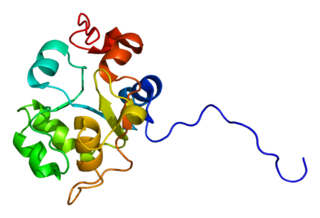
DnaJ homolog subfamily A member 1 is a protein that in humans is encoded by the DNAJA1 gene.

COP9 signalosome complex subunit 8 is a protein that in humans is encoded by the COPS8 gene.

Disks large-associated protein 5 (DAP-5) also known as discs large homolog 7 (DLG7) or hepatoma up-regulated protein (HURP) is a protein that in humans is encoded by the DLGAP5 gene.

Ubiquitin-conjugating enzyme E2 D3 is a protein that in humans is encoded by the UBE2D3 gene.

Ubiquitin carboxyl-terminal hydrolase 8 is an enzyme that in humans is encoded by the USP8 gene.

Ubiquitin/ISG15-conjugating enzyme E2 L6 is a protein that in humans is encoded by the UBE2L6 gene.

Signal transduction protein CBL-C is a protein that in humans is encoded by the CBLC gene.

Serrate RNA effector molecule homolog (SRRT) also known as arsenite-resistance protein 2 (ARS2) is a protein that in humans is encoded by the SRRT gene.

Ankyrin repeat and SOCS box protein 2 is a protein that in humans is encoded by the ASB2 gene.

E3 ubiquitin-protein ligase RNF19A is an enzyme that in humans is encoded by the RNF19A gene.

Ubiquitin-conjugating enzyme E2 G1 is a protein that in humans is encoded by the UBE2G1 gene.

Protein deltex-1 is a protein that in humans is encoded by the DTX1 gene.

Protein ariadne-1 homolog is a protein that in humans is encoded by the ARIH1 gene.

Ubiquitin-conjugating enzyme E2 J1 is a protein that in humans is encoded by the UBE2J1 gene.

Ubiquitin-conjugating enzyme E2 E2 is a protein that in humans is encoded by the UBE2E2 gene.

Protein phosphatase Slingshot homolog 2 is an enzyme that in humans is encoded by the SSH2 gene.

NEDD8-conjugating enzyme Ubc12 is a protein that in humans is encoded by the UBE2M gene.

Neuralized-like protein 2 is a protein that in humans is encoded by the NEURL2 gene.

Deltex E3 ubiquitin ligase 3 is a protein that in humans is encoded by the DTX3 gene.

Deltex E3 ubiquitin ligase 3L is a protein that in humans is encoded by the DTX3L gene.






















